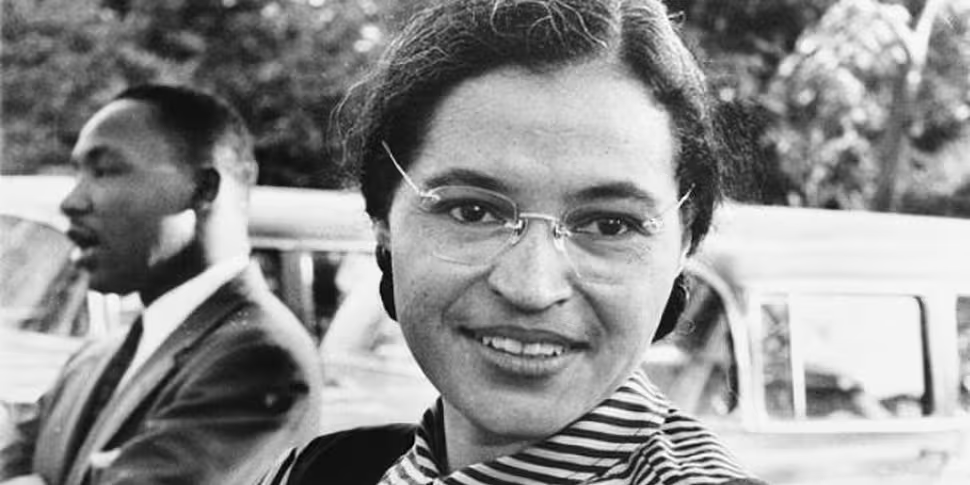It's International Women's Day this Sunday, and to mark the event the Friday Right Hook panellists have chosen their most inspiring women from history.
You can read more about their picks below. They will be talking about their choices throughout the show, and you can listen live here: http://www.newstalk.com/player/
George – Rosa Parks
Born in 1913, Rosa Parks made the history books on December 1, 1955 when she refused to give up her seat on a bus.
Rosa's refusal to give up her seat for white passengers sparked the Montgomery Bus Boycott - a protest against segregation that proved one of the defining events in the history of the American Civil Rights movement.
Having been an activist for many years before the incident on the bus, she remained a key figure in the civil rights movement for decades afterwards.
Despite suffering many personal hardships, she continued to fight for causes including workers rights and housing issues. She fought for freedom for political prisoners and against police abuse. She was recipient of many honours, including the Martin Luther King Jr Award and the Presidential Medal of Freedom.
Rosa Parks died aged 92 in 2005. On the 100th anniversary of her birth, President Barack Obama proclaimed "just wanting to get home after a long day at work, Rosa Parks may not have been planning to make history, but her defiance spurred a movement that advanced our journey toward justice and equality for all".
Dave – Christine Buckley
Christine Buckley was abandoned at three weeks of age. Her mother was Irish and married, while her father was a medical student from Nigeria.
Four-year-old Christine was sent to Goldenbridge orphanage, where she went through primary and secondary school.
Christine says she suffered horrendous and continual abuse by the nuns at the school until she left Goldenbridge when she was 17 years old.
In 1988, she met her father in Nigeria - three years after contacting her mother. In 1992, she famously appeared on the Late Late Show where she recounted some of her experiences at Goldenbridge. Christine also featured in a documentary called Dear Daughter in 1996.
She helped found the Aislinn Centre, which provides assistance to the survivors of institutional abuse and their families.
At the time of Christine's death in 2014, Barnardos Chief Executive Fergus Finlay said, “Christine was a fighter, a survivor, an advocate, a charmer, a hero among heroes. The world is a lesser place for her passing. Her legacy will live on in our collective recognition of the need for a better child welfare and protection system."
Shane – Margaret Thatcher
The longest serving Prime Minister in British history - and undoubtedly one of the most divisive - Margaret Hilda Thatcher, née Roberts was born in 1925.
She remains the only woman to have ever held the position of Prime Minister, serving from 1979 until late 1990, when she was succeeded by John Major.
A grocer's daughter, she won a place at Oxford and was originally trained as a research chemist, and later became a barrister. She became involved in politics in 1950, running for local election in the Dartford constituency. She married Denis Thatcher the following year.
In 1975 she succeeded Edward Heath as leader of the Conservative Party, and Leader of the Opposition. Four years later, she was Prime Minister. She was re-elected Conservative Prime Minister in 1983, the Falklands War having caused her popularity to surge.
She earned the nickname 'The Iron Lady' - a phrase coined by a Soviet journalist - and was a staunch conservative. She signed the Anglo-Irish agreement with Garret Fitzgerald in 1985. She won a third term in 1987, but resigned as prime minister and party leader in 1990.
She was always a controversial figure at home in Britain and abroad (especially in Ireland) throughout her life, but also one of the most influential political figures of contemporary history. She died in April 2013.
Ciara - Emmeline Pankhurst

Born as Emmeline Goulden in 1858, Emmeline Pankhurst became one of the leading members of the British suffragette movement of the late 19th and early 20th century.
She founded the Women's Social and Political Union in 1903 - an organisation that operated under the slogan 'deeds not words'.
Along with her three daughters, Pankhurst initially led non-violent protests through the newly formed group. However their tactics grew more militant over subsequent years. Pankhurst was imprisoned on a number of occasions.
Eventually the group turned to actions including arson, which divided members - and indeed Pankhurst and two of her daughters.
While the WSPU dissolved in 1917, Emmeline Pankhurst remained politically active up until her death in June 1928. She co-founded the Women's Party, but ultimately joined the Conservative party, spurned by her opposition to Bolshevism.
Less than a month after her death, a government act extended the vote to all women over 21 years of age. Today Pankhurst is remembered as one of the most important individuals in helping achieve the suffragettes' goals.
As politician Stanley Baldwin said in 1930, while unveiling a statue of Pankhurst, "I say with no fear of contradiction that, whatever view posterity may take, Mrs Pankhurst has won for herself a niche in the Temple of Fame which will last for all time."









